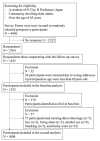Low Dietary Variety Is Associated with Incident Frailty in Older Adults during the Coronavirus Disease 2019 Pandemic: A Prospective Cohort Study in Japan
- PMID: 36904144
- PMCID: PMC10005648
- DOI: 10.3390/nu15051145
Low Dietary Variety Is Associated with Incident Frailty in Older Adults during the Coronavirus Disease 2019 Pandemic: A Prospective Cohort Study in Japan
Abstract
Background: Stagnation of social activity due to the COVID-19 pandemic probably reduces motivation to maintain a healthy diet. It is important to report on the dietary changes observed in older adults during a period of restriction on outings and to clarify the relationship between dietary variety and frailty. This one-year follow-up study examined the association between frailty and dietary variety during the COVID-19 pandemic.
Methods: Baseline and follow-up surveys were conducted in August 2020 and August 2021, respectively. The follow-up survey was distributed by mail to 1635 community-dwelling older adults aged ≥65 years. Of the 1235 respondents, 1008 respondents who were non-frail at baseline are included in this study. Dietary variety was examined using a dietary variety score developed for older adults. Frailty was assessed using a five-item frailty screening tool. The outcome was frailty incidence.
Results: In our sample, 108 subjects developed frailty. A linear regression analysis revealed a significant association between dietary variety score and frailty score (β, -0.032; 95% CI, -0.064 to -0.001; p = 0.046). This association was also significant in Model 1, adjusted for sex and age, (β, -0.051; 95% CI, -0.083 to -0.019; p = 0.002) and in a multivariate analysis that added adjustments for living alone, smoking, alcohol use, BMI, and existing conditions to Model 1 (β, -0.045; 95% CI, -0.078 to -0.012; p = 0.015).
Conclusions: A low dietary variety score was associated with an increased frailty score during the COVID-19 pandemic. The restricted daily routine caused by the COVID-19 pandemic will probably continue to have a long-term effect in terms of reduced dietary variety. Thus, vulnerable populations, such as older adults, might require dietary support.
Keywords: SARS-CoV-2 outbreak; diet; dietary behavior; frailty; older adults.
Conflict of interest statement
The authors declare that they have no competing interests.
Figures
References
-
- WHO Coronavirus (COVID-19) Dashboard. who.int. [(accessed on 16 February 2023)]; Available online: https://covid19.who.int/
-
- Cabinet Office, Japan. [(accessed on 7 September 2022)]; Available online: https://www.mhlw.go.jp/stf/covid-19/seifunotorikumi.html.
-
- Ministry of Health, Labour and Welfare. [(accessed on 7 September 2022)]; Available online: https://www.mhlw.go.jp/content/10900000/000892287.pdf.
-
- Cabinet Office, Japan. [(accessed on 7 September 2022)]; Available online: https://corona.go.jp/news/
MeSH terms
Grants and funding
LinkOut - more resources
Full Text Sources
Medical
Miscellaneous


